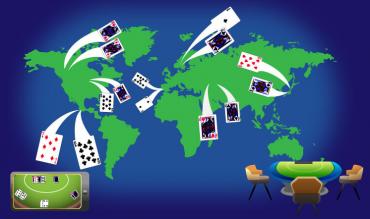Blackjack is blackjack: your goal is to beat the dealer whether you play in land-based or online casinos in the U.S., Europe, Asia, Caribbean, or any other part of the world. However, playing live blackjack abroad in a land-based casino has some differences compared to playing in the U.S. The following table summarizes the differences.
(Note: Peruse the table to compare the differences in rules before reading about the no-hole-card rule, which follows.)
| U.S. | Abroad |
|---|---|
| Mostly six decks, but also single- and double-deck games. | Mostly six-deck games, and the rules, in general, are not as good. |
| Dealer takes her hole card before players can play their hands. | No-Hole-Card Rule: Dealer does not take her second card until after all the players have completed their hand. |
| If you double down or pair split and lose to a dealer’s blackjack, you lose only your initial wager. | European No-Hole-Card Rule abbreviated ENHC: If you double down or pair split and lose to a dealer’s blackjack, you lose all wagers. |
| Common form of surrender is late surrender. You can surrender your hand only after the dealer has checked for a blackjack and doesn’t have it. | Some casinos offer early surrender. You can surrender your hand before the dealer checks for a blackjack. |
| In most casinos, you are offered insurance only when the dealer shows an Ace upcard. Some casinos also allow players to take insurance when the dealer has a 10-value upcard. | In some land-based & online casinos in Europe, in particular, England, you can only make the insurance bet when you have a blackjack (which is the same as Even Money). |
| Card counting is less tolerated in the U.S. | There are often better games for card counters abroad than in the U.S., and in general, bigger bet spreads are more tolerated. |
| If you travel abroad and win large sums of cash, upon entering the U.S. you must declare more than $10,000 in currency or “monetary instruments.” | U.S. citizens have to deal with currency exchange going abroad and returning home, and also must often carry large sums of cash in foreign countries (currency laws can vary from one country to another). |
| You can legally be rated using an alias. | In casinos abroad, you usually have to show your passport for identification. Obtaining passports with false names is a crime. |
| You’re more likely to find single-deck games that pay 6-5, games dealt with continuous shufflers, blackjack variants (like Superfun 21 and Spanish 21), and side bets (like Royal Match and Lucky Ladies). | You’re more likely to find traditional blackjack games that pay 3-2 for an untied blackjack, with no side bets and few blackjack variants, except the popular Pontoon. |
NO-HOLE-CARD RULE
With the no-hole-card rule, the dealer does not take her second card until after all the players have completed their hand. Some players mistakenly believe this gives the casino an extra advantage because the dealer is less likely to bust when the cards are dealt consecutively, rather than when the dealer’s second, and possibly additional draw cards, are dealt after the players have drawn their cards.
Mathematically, it makes no difference in the long run whether the dealer takes her second card before players act on their hand, or she waits and takes the second card after the players act. The no hole card, per se, has no effect on the odds of blackjack, or on the basic playing strategy (so if you hold a 16, you play it the same way regardless if the dealer has a hole card or not).
EUROPEAN NO-HOLD-CARD RULE (ENHC)
What affects your odds and your playing strategy in no-hole-card games is when a player loses additional wagers made on splitting and doubling when the dealer’s second card gives her a blackjack. This occurs with ENHC and it increases the house edge by about 0.11 percent (rule dependent). It also requires a modification to the basic playing strategy.
The following table shows the strategy differences for a multi-deck ENHC game (dealer hits soft 17 and players can double down after pair splitting), compared to an American game with the same rules. Essentially, the strategy changes occur when the dealer shows a 10 or Ace and include:
- hitting a hard 11 against a dealer 10
- hitting a pair of Aces against a dealer Ace, and
- hitting a pair of eights against a dealer 10 and Ace.
| American Rules | ENHC | |||
| Player Hand/Dealer Upcard | 10 | Ace | 10 | Ace |
| Hard 11 | Double | Hit | Hit | Hit |
| Ace-Ace | Split | Split | Split | Hit |
| 8-8 | Split | Split | Hit | Hit |
The above modifications to the playing strategy, for ENHC, assume surrender is not offered. In a future article, I’ll explain the strategy changes when the latter is offered.
